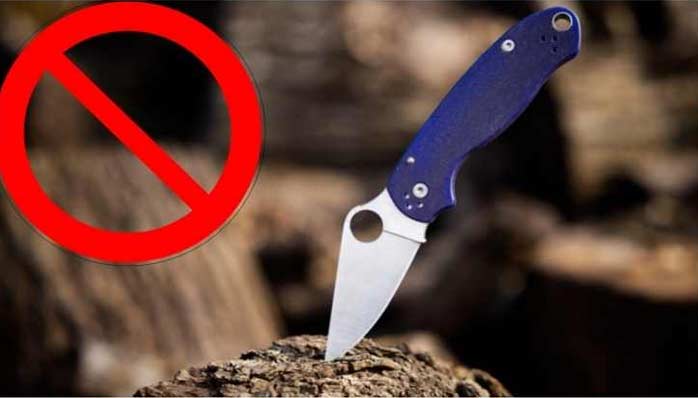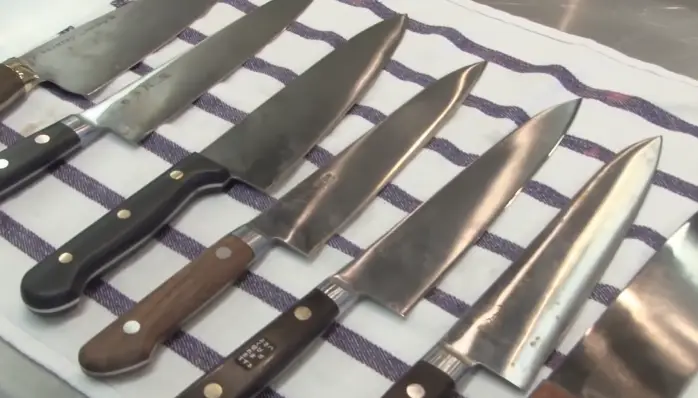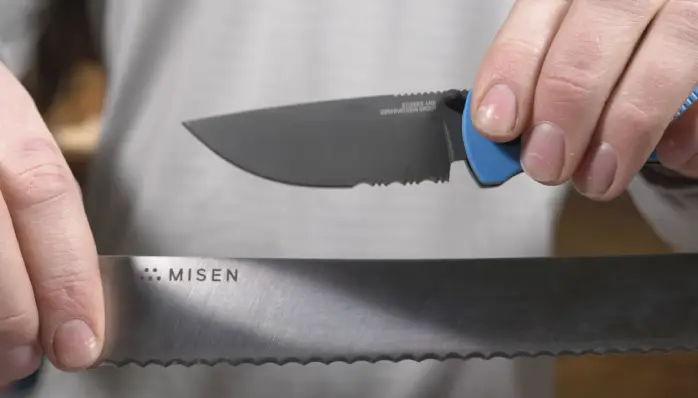When Should a Knife Be Cleaned and Sanitized?
When it comes to cutting, slicing, and chopping food, a knife is one of the most important kitchen tools that every home cook will use on a daily basis. That is why the cleanliness of a knife directly relates to food safety.
Hence, it is imperative that you are aware of when should a knife be cleaned and sanitized. Please read this article carefully as we will discuss when you must clean your knives and how they should be cleaned.
What Problems Lead to a Dirty Knife?

A dirty knife can lead to a number of problems. It can cause the spread of harmful bacteria, and it can also damage the knife’s blade. In addition to food-borne illnesses, dirty knives can also lead to contamination and cross-contamination with other different foods that you are preparing.
If your knives are not clean, they are also more likely to slip off the surface they are cutting, leading to injuries or damaged dishes.
Why Should Knives Be Cleaned and Sanitized?
Every year on 24 August, people commemorate National Knife Day. During this day, people collect new knives. As well as collecting knives, ensure those knives are clean and sanitized.
It’s imperative that you keep your knives in good condition. Many reasons exist for knife sanitation and cleaning. The following are a few reasons why you should maintain your knives in a clean and sterile condition.
1. Food Hygienic
The first and foremost reason for cleaning your knives is for food hygiene. If you’re using a dirty knife to cut, slice, or chop certain foods like meat, poultry, fish, and vegetables, you run the risk of spreading harmful bacteria all over the items that you’re preparing.
This can lead to some serious health problems like food poisoning and contamination. As a result, to prevent the spread of harmful microbes and maintain your knives’ condition, you must keep them clean.
In this way, you will not have to worry about food contamination and becoming ill from the foods you prepare.
2. Avoid Injury
Knives that are not clean may also cause injury. Unclean kitchen knives present a significant risk. You risk cutting yourself much more often because the blade will be much slipperier than usual, and it could slip off of the food contact surface that you’re cutting resulting in an injury.
If you do not want to take this chance, make sure that your knives are always clean so you know they are safe to use. Knife safety begins with cleaning.
3. Maintain the Quality of Your Knives
Another reason for cleaning and sanitizing your knives is to keep them in good condition. If you don’t clean and sterilize them, they can become rusty or dirty which will affect their functionality.
The time and effort you spend buying good knives are wasted if they are not in their best condition. You can prolong the life of your knives by cleaning them regularly.
This will also allow you to save some money in the long run because you don’t have to buy new knives every time one becomes dull.
4. Keep You and Your Family Safe
You and your family are at risk if you use dirty knives. When you use dirty knives, the germs on them will transfer to any food that you cut or slice.
Your family then runs the risk of getting sick if they eat the contaminated food. To avoid this potentially dangerous situation in your home, make sure that all of your knives are clean and sanitized. This way, everyone can stay safe while eating the food you prepare.
When Should a Knife Be Cleaned and Sanitized?
After learning the purpose behind cleaning and sanitizing your knives, let us now look at when you should clean them.
In general, it is advisable to clean your knives after each use. This will ensure that all of the bacteria and germs on them are gone and that they will still be in good condition when you need to use them again.
But there are some instances when you must sanitize and clean your knives immediately. Below, you will find a list of situations in which it is necessary to clean and sanitize your normal or serrated knives right away.
1. After Chopping Every Kind of Raw Meat

When you cut meat with your knives, it is important to clean and sanitize them immediately.
If you cut a piece of raw meat, a whole variety of harmful bacteria like E. coli, listeria, and salmonella are transferred to the surface of the blade.
This is dangerous because if you then proceed to cut other food items with the same knives, you will spread those bacteria all over them, and they too can be contaminated.
When this happens, you put yourself and your family at risk of getting sick from the contaminated food.
The Centers for Disease Control and Prevention (CDC) estimate that 48 million Americans get sick each year as a result of food poisoning. In addition, 128,000 people are hospitalized, and 3,000 die as a result of foodborne illnesses.
To avoid this potentially dangerous situation, simply clean and sanitize your knives after chopping raw chicken or meat.
By doing so, you can rest assured that all bacteria from the raw meat have been removed and there will be no risk of contamination of other food.

2. After Cutting Onions and Garlic
Onions and garlic are commonly used in food preparation. If you use them, you probably know that they can irritate your skin and eyes as well as cause a bad odor on your hands.
As time passes, the odor gets stronger and your hands start to smell even after washing them. The fluid from onions and garlic can stain your knives and plastic cutting boards.
so It is important to clean and sanitize your knives as soon as possible after chopping onions and garlic to avoid any future inconvenience.
3. After Scaling Fish
When you scale a fish, your knives and cutting board may become stuck with scales and blood. This is troublesome because scaling a fish releases harmful bacteria that will spread all over the surface of your blade and board if not cleaned immediately.
Furthermore, scaling is messy and can produce unpleasant odors. So make sure you clean and sanitize your knives as soon as possible after scaling fish to avoid any future inconveniences.
How to Clean and Sanitize Your Knives?

Having learned when and why you should clean and sanitize your knives, let’s take a look at how to do it. The knife cleaning and sanitization process are fairly easy.
You will merely have to follow a few simple steps to accomplish this task. Consequently, the blade will be clean and free from any traces of bacteria. Listed below are the steps that should be taken to clean your knives.
Step 01: Collect the Things You Need
For the purpose of cleaning your knife’s handle and blade, you will need a few essential items on hand. You will need a bowl, liquid soap or mild detergent or bleach, a sponge, and a clean paper towel for this task.
These items will assist in the cleaning process. Ensure that you have them all ready before beginning the cleaning process.
Step 02: Mix water with Liquid Soap or Detergent
In a bowl, add just enough normal water to cover the entire blade of your kitchen knife.
Next, pour some liquid soap or mild detergent into the bowl and mix well. Ensure that there is enough soap or detergent in the bowl to form a lather when you are scrubbing the knives later on.
Step 03: Soak Your Knife in Soapy Water
Once you have prepared your mixture of sanitizer, put your knives into the soapy water. Let it soak in the soapy water for about a few minutes. Ensure that both sides of the knife’s blade and handle are soaking at this point.
Step 04: Scrub Your Knife with a Sponge
After allowing it to soak for a few minutes, take the knife out of the solution and start scrubbing. Using a wet sponge, scrub both sides of your kitchen knife blade from top to bottom. Work methodically so that you don’t miss any part of the surface.
Step 05: Place Knife in Warm Water
After successfully scrubbing the knives, it needs to be washed off. Take a clean bowl and put some warm water or slightly hot water into it.
Then, submerge your knife’s handle and blade in the water and leave them there for a few minutes. By doing so, you will help to kill germs on the kitchen and pocket knife.
Step 06: Rinse Your Knife
Take your knives out of the warm or hot water and rinse them off with normal water. Make sure that you remove any dish soap residue from the knives.
Step 07: Dry Your Knife
Finally, after rinsing off your knife, dry it using a paper towel or a cloth. Carefully wipe off any water from the surface of the knives. Ensure that no water droplets remain on the knives.
Step 08: Store Your Knife
Once your knives have been cleaned and dried, it is ready to be stored away. A knife block is an ideal method of storing knives. You can protect your knives from potential damage when storing them in a knife block. Ensure that the knives are stored on a clean surface and away from moisture.
Frequently Asked Questions:
There are some frequently asked questions that people ask concerning knives. Listed below are a few of these questions with answers.
1. How Often Should I Clean My Knife?
The cleaning of your knives should be performed after each use. This will help to prevent the spread of harmful germs and keep your knives in good condition.
2. Is It Possible to Clean Knives In the Dishwasher?
The dishwasher can be used for cleaning your knives, but it is strongly recommended not to do so. Due to the fact that the dishwasher can damage the blade and handle of your kitchen knife.
3. What Happens If I Don’t Clean My Knives Frequently Enough?
If you don’t clean your knives, they will begin to accumulate microorganisms. This can make the blades dull over time and could potentially harm you if not handled carefully.
Your knife’s blade may also begin to rust over time. This could result in permanent damage and potentially create a choking hazard during use.
4. Does Water Have the Ability to Dull Knives?
Yes, water is able to dull knives. This can occur if you immerse your knives in water for several days. As a result, it is vital that you keep your knives dry and stored in a knife block.
Conclusion
After reading the article, it is hopefully clear to you when should a knife be cleaned and sanitized and how to do it.
You can now easily clean and sanitize your knives in order to maintain their good condition and functionality. Additionally, your health will benefit as you will be protecting yourself against harmful germs.
Read More: How to Maintain a Pocket Knife







